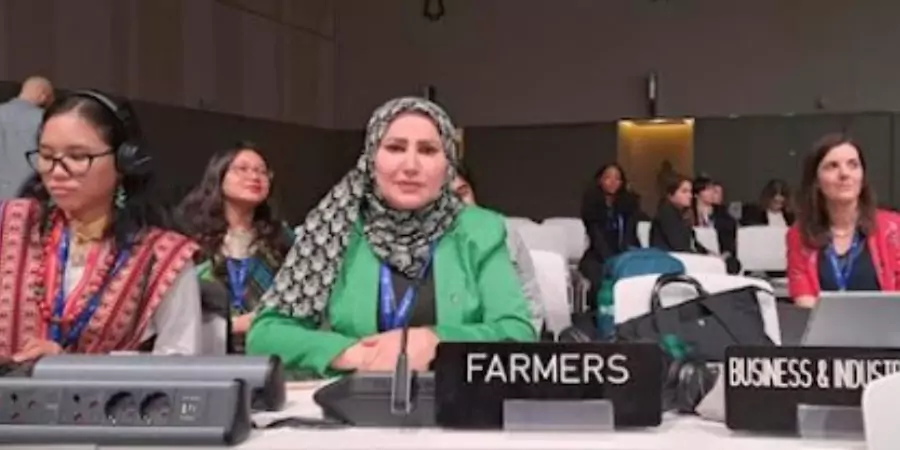In the Arab world, women farmers often face significant barriers, including long working hours, low pay, and a lack of labor recognition. Dr. Zeinab Al-Momany, a prominent social entrepreneur, has been at the forefront of addressing these challenges through her leadership of the Sakhrah Women’s Society Cooperative and the Specific Union for Productive Farmer Women in Jordan (SUFWJ). This case study examines the impact of SUFWJ on women farmers in Jordan, focusing on its initiatives for economic empowerment, advocacy, and climate change adaptation.
Background
Dr. Al-Momany founded the Sakhrah Women’s Society Cooperative in 2007, inspired by her vision of empowering female farmers and improving their socio-economic status. With a Ph.D. in Philosophy of Management and extensive experience in business management, she recognized the urgent need to enhance the capacities of small agricultural organizations in Jordan.
The SUFWJ, established in the same year, has grown to unite 22 women’s organizations and boasts 5,000 members. Its mission focuses on advancing women’s rights, improving agricultural practices, and promoting sustainable development. Dr. Al-Momany’s leadership extends beyond Jordan, as she holds positions in various international organizations, including the Arab Farmer Network and the World Farmer Organization.
Initiatives and Impact
- Economic Empowerment Programs
One of SUFWJ’s primary goals is to empower women economically. The union conducts needs assessments every two to five years, enabling it to create targeted action plans that address the specific challenges faced by female farmers. These initiatives have led to significant achievements:
- Land Ownership: The percentage of women owning land increased from 2.7% in 2007 to 5.5% today, thanks to advocacy efforts that revised internal regulations allowing women to join the union by renting land rather than owning it.
- Leadership Roles: The union has empowered 120 women farmers to take on leadership positions within their communities.
- Training and Education: SUFWJ has trained 7,000 women and girls in agricultural best practices, financial literacy, and entrepreneurship, equipping them with the skills needed for sustainable farming.
- Health and Social Insurance: The union has provided health insurance to 578 families and continues to work towards expanding coverage through partnerships with organizations like USAID.
- Advocacy for Women’s Rights
Dr. Al-Momany emphasizes the importance of legal advocacy in addressing the inequalities faced by female farmworkers. SUFWJ actively campaigns for:
- Equal Wages: Women farmers often earn significantly less than their male counterparts and foreign workers. SUFWJ’s advocacy efforts aim to ensure that female farmers receive fair compensation for their labor.
- Social Security and Health Benefits: The union works to amend labor laws to include female farmers in social security programs and health insurance. This advocacy has already led to changes in the General Farmers Union, allowing women to participate without needing to own land.
- Climate Change Adaptation
The impacts of climate change pose significant challenges for farmers in Jordan, particularly women who work long hours under harsh conditions. SUFWJ has initiated programs aimed at raising awareness and promoting sustainable practices to mitigate these effects:
- Renewable Energy: The union provides loans for women farmers to install solar panels and solar water heaters, reducing their reliance on conventional energy sources.
- Water Management: Efforts to dig wells for rainwater collection are crucial in a country suffering from water scarcity. These initiatives help improve water availability for agricultural use.
- Organic Farming: SUFWJ promotes organic farming practices, encouraging farmers to use organic fertilizers and focus on environmental sustainability. This approach not only improves crop quality but also enhances soil health.
Challenges Faced
Despite its successes, SUFWJ faces ongoing challenges:
- Cultural Barriers: Societal norms often restrict women’s roles in agriculture and decision-making processes. Overcoming these cultural barriers requires sustained advocacy and community engagement.
- Economic Constraints: Limited access to funding and resources hinders the scalability of initiatives. Continuous support from international organizations is essential for the union’s growth.
- Climate Vulnerability: The effects of climate change, including rising temperatures and water scarcity, disproportionately impact women farmers. Addressing these issues requires innovative solutions and strong community resilience.
Lessons Learned
The journey of SUFWJ and Dr. Al-Momany offers several key insights:
- Empowerment Through Collaboration: Collective action among women enhances their bargaining power and ability to drive change. Building networks and cooperatives can amplify individual efforts.
- Targeted Programs Yield Results: Tailoring initiatives to the specific needs of women farmers ensures that resources are effectively utilized and goals are met.
- Advocacy is Crucial: Legal and policy advocacy plays a vital role in dismantling barriers and promoting equity. Engaging with policymakers and stakeholders is essential for sustainable change.
Conclusion
The work of Dr. Zeinab Al-Momany and the Specific Union for Productive Farmer Women in Jordan represents a significant step toward empowering women farmers in the Arab world. Through economic empowerment, advocacy for rights, and initiatives addressing climate change, SUFWJ is transforming the landscape for women in agriculture. As these women continue to break barriers and lead social change, their success serves as an inspiring model for communities across the region, highlighting the critical role of women in building a sustainable and equitable future.
Read Also: Women Leading Social Change and Community Development: Building Communities










